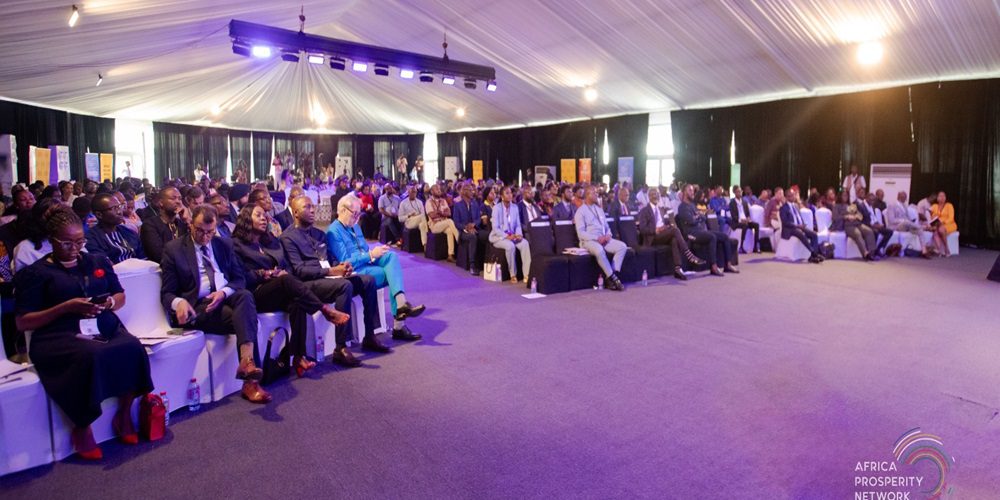Mobile interoperability holds potential to replace Africa’s single currency dream -Dr Bawumia
Vice-President Dr. Mahamudu Bawumia has called on African countries to prioritize mobile money interoperability over the long-standing goal of achieving a single currency.
He made this call at a continental symposium organized by the Africa Prosperity Network (APN) themed “Scaling up Interoperability, Using Mobile Money to Buy and Sell.”
Dr. Bawumia argued that efforts to achieve a common African currency have been hampered by diverse macroeconomic conditions across Africa’s 54 countries, 41 currencies, and four exchange rate systems.
“One of the major problems of achieving a common currency, even within the West African monetary zone, has been the difficulty of our respective countries to attain the macroeconomic convergence criteria. We need to focus on what we can achieve now, which is mobile money interoperability,” he stressed.
He emphasized that digital payment systems offer a more practical solution for economic convergence across the continent, arguing that the idea of a common currency has been overtaken by the digital payments age.
“Today, mobile money can function as a common currency if made interoperable. We should move away from macroeconomic convergence criteria to digital payments convergence criteria.”
Dr. Bawumia suggested an incremental approach, proposing that countries like Ghana and Nigeria take the lead in implementing mobile money interoperability, stressing the need for cooperation among central banks, telecommunications companies, and strong political will to drive this initiative.
Referencing trade statistics from the African Union’s 2020 annual trade report, Dr. Bawumia highlighted the challenges facing intra-African trade.

Intra Africa trade challenges
The report suggested that despite a slight increase in the share of intra-African exports from 18.2% in 2013 to 19.6% in 2020, the total value of these exports has declined.
Intra-African trade remains low, with imports averaging 13% and exports 20% over the past seven years.
The settlement of these trades often involves foreign exchange, adding pressure on African currencies and increasing transaction costs and complexity.
Reducing costs, improving transaction speeds
Dr. Bawumia pointed out that mobile money interoperability could address many of these trade challenges by reducing costs, improving transaction speeds, and increasing financial inclusion. “Ghana’s experience with mobile money interoperability, which integrates telcos and banks, has resulted in the fastest-growing mobile money market in Africa and significantly increased financial inclusion,” he noted.
Seamless trade across the continent
He emphasized that making mobile money interoperable allows citizens across the continent to trade seamlessly, providing the benefits of a common currency without necessarily having one.
The Vice-President emphasized the importance of political will in driving mobile money interoperability.
“My own experience in driving mobile money interoperability in Ghana tells me that without political will, it is not likely to be done. It takes a lot to pull these telcos together to come on a common platform.
“Having finished with domestic mobile money interoperability, I am now going to focus on continental mobile money interoperability. We should push it and drive it at the political level so that we can help the continent scale up mobile money interoperability. I believe it is possible, and we should strive to achieve it.”
Dr. Bawumia urged African countries to collaborate and take incremental steps towards mobile money interoperability, stressing that it can provide a solid foundation for the continent’s economic integration and growth.
Governor of the Bank of Ghana (BoG), Dr. Ernest Addison, highlighted the transformative role of smartphones in providing many Africans their first interaction with the financial sector.
Costly cross-border payments
He added, however, that despite this, cross-border payments within Africa remain costly, with a $100 transfer sometimes resulting in only $40 being received.
This scenario, he said, presents an opportunity to enhance cross-border transactions on the continent, with the interoperability of payment systems at the forefront of financial advancements.
Dr. Addison recalled that Ghana faced some challenges with ATM interoperability, where customers of one bank could not use the ATMs of another.
However, significant progress has been made, and now there is interoperability among mobile money accounts and bank accounts.
This advancement in mobile money technology showcases the potential for establishing comprehensive cross-border payment interoperability, which could deliver seamless payments across African countries and improve financial inclusivity for youth, vulnerable groups, and entrepreneurs.
Robust infrastructure, regulatory frameworks
He emphasized that achieving such interoperability will require harmonized regulatory frameworks, consistent technical standards, and robust infrastructure.
Additionally, strong public-private partnerships involving mobile network operators, financial institutions, fintech companies, and regulators are essential to address technical challenges and ensure regulatory compliance.
Mr. Gabby Asare Otchere-Darko, the Executive Chairman and Founder of APN, said numerous mobile operators and financial institutions worked in silos, creating an environment of limited interoperability that constrained Africa’s economic potential.
He underscored the relevance of the symposium, noting that it was a step towards unlocking the full potential of the African Continental Free Trade Agreement (AfCTA).
Telecoms payment architecture
Experts and industry players in the financial and telecommunications sectors in Africa also made a clarion call on heads of state, heads of financial institutions, as well as regulators in the financial and telecommunications industry to commit to a payment architecture that will be interoperable across all borders on the continent.
A continent-wide system where all African countries can purchase goods and services and make payments through the use of a mobile money interoperability infrastructure, according to the experts and industry leaders, is attainable, but the commitment of decision-makers is needed to make it a reality.
Financial inclusion
Experts essentially discussed financial inclusion as a catalyst for prosperity and emphasized the importance of interoperability in driving economic growth across Africa.
They highlighted the potential for mobile money to bridge gaps in financial services and empower communities.
On the subject of payment systems, industry players discussed the essential components and strategies for creating an integrated payment system to boost intra-African trade.
The focus was on leveraging digital trade, regulatory support, and innovative technologies.
Panelists at the symposium also underscored the need for regulatory harmonization and cooperation between countries to facilitate seamless transactions, emphasizing the importance of building a unified regulatory framework that supports innovation while ensuring security and compliance.
Representatives from leading telecommunications companies shared insights on their preparedness, the technological advancements needed to support interoperability, as well as the challenges and opportunities in implementing cross-border mobile money solutions.
What needs to be done
On what needs to be done in the short, medium, and long term to achieve interoperability in Africa, the experts and industry leaders called for continued advocacy across key policy partners.
They proposed the finalization of a legal framework and the constitution of a governance committee that would work with a technical working group, including a SAPA team, as well as the execution of a pilot mechanism with anchor bank, fintech, and telco partners.
APN is a non-profit organization founded to advance the vision of “The Africa We Want” as outlined in the African Union’s Agenda 2063, with a particular focus on promoting Africa’s prosperity and economic integration.
APN is the vehicle that runs the Africa Prosperity Dialogues, an initiative committed to creating platforms for partnerships among political and business leaders, civil society, academia, and traditional authorities in Africa.
This is aimed at driving the rapid development of the continent through dialogues and consensus-building on issues of trade, commerce, and strengthening African economies.




